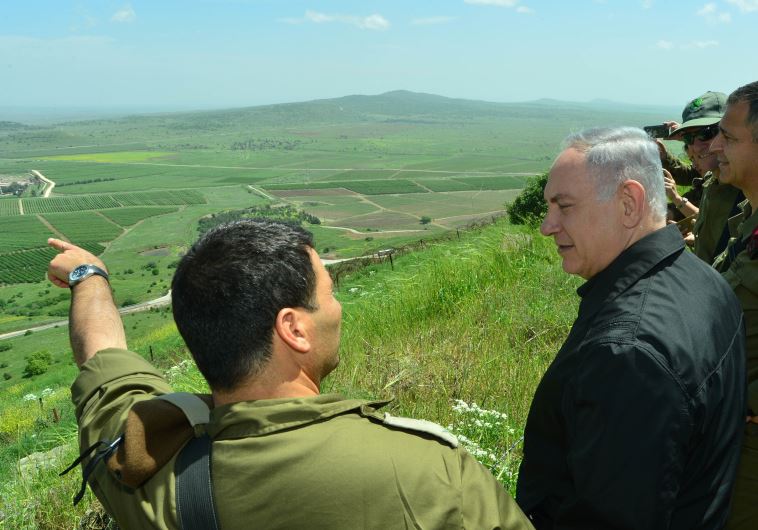Netanyahu: Israeli actions beyond northern border kept Hezbollah from ‘game-changing’ arms
Jerusalem Post/April 11/16/
Prime Minister Benjamin Netanyahu acknowledged on Monday that Israel has taken action dozens of times beyond the northern border to prevent Hezbollah from attaining “game-changing” weaponry.”
Netanyahu’s comments came during a visit to Golan Height to observe a large scale maneuver of reservists in the Paratroopers Battalion.
“We are proud that in the stormy and volatile Middle East, we were able to maintain relative calm and relative safety in Israel. We act when we should act, including here, across the border, in dozens of attacks, to prevent Hezbollah from getting game-changing weaponry,” the premier said.
Netanyahu said that Israel was acting on other fronts as well, “nearby and far away, but are doing it in an intelligent manner.” He said Israel was facing Islamic State and Hezbollah in the north, Hamas and Islamic Jihad in Gaza, and the Islamic State and global Jihadists in Sinai.
“If we are required to go into battle, and that is a possibility that lies ahead, which is why you are here, it is because we were unable to prevent the dangers to Israel through other means,” he said.
Speaking to the soldiers, Netanyahu said “this is our country, and we need to defend it; nobody else will defend it except us,” Netanyahu said. “You look at the earthquake around us and you see people and countries wiped out, and if anyone expects someone to come to his aid , that will not happen. If we have learned anything, it is that we need to be able to defend ourselves by ourselves – that is also the significance of the reserve duty you are doing here.”
One piece of advanced weaponry that Israel did not succeed in blocking from reaching the hands of its enemies is the S-300 anti missile system, which Russia has reportedly begun supplying to Iran.
According to Iranian media reports on Monday, Russia has delivered the first part of the surface-to-air system – first deployed at the height of the Cold War in 1979 in the USSR to defend large industrial facilities and military bases – to Iran.
In its updated form this system is one of the most advanced systems of its kind and, able to engage multiple aircraft and ballistic missiles around 150 km away, potentially making it more difficult to attack the Islamic Republic’s nuclear facilities from the air.
Israel and the US have been trying to prevent the sale of the system to Iran for nearly a decade.
In a recorded transmission, Iranian state television showed Foreign Ministry spokesman Hossein Jaber Ansari telling a news conference on Monday: “I announce today that the first phase of this (delayed) contract has been implemented.” Ansari was replying to reporters’ questions about videos on social media showing what appeared to be parts of an S-300 missile system on trucks in northern Iran.
Russia says it cancelled a contract to deliver S-300s to Iran in 2010 under pressure from the West. President Vladimir Putin lifted that self-imposed ban in April 2015, after an interim agreement that paved the way for July’s full nuclear deal.
Israel had no response to the reports that the supply of the system had begun. Prime Minister Benjamin Netanyahu is scheduled to travel to Russia on April 21 for talks with Russian President Vladimir Putin, during which arms sales are expected to be raised.
In November, Russia’s ambassador to Israel Alexander Shein told The Jerusalem Post that Moscow never annulled this contract and “as an act of goodwill only suspended it for the period of international sanctions on Iran.” He said that Russia would likely implement the contract after the initial lifting of the sanctions on Iran early in 2016.
Reuters contributed to this report.























